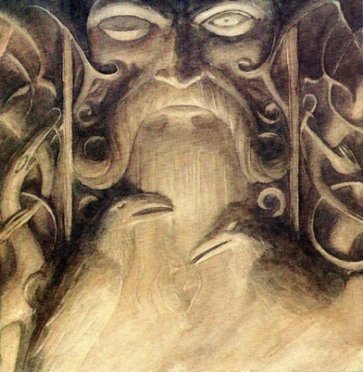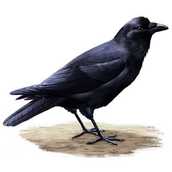Across its range in the northern hemisphere, and throughout human history, the Common Raven has been a powerful symbol and a popular subject of mythology and folklore.

In many Western traditions, ravens have long been considered to be birds of ill omen, in part because of the negative symbolism of their all-black plumage. In Sweden, ravens are known as the ghosts of murdered people, and in Germany as the souls of the damned. In Danish folklore, a Valravn that ate a king's heart gained human knowledge, could perform great malicious acts, could lead people astray, had superhuman powers, and were "terrible animals".
In contrast, many indigenous peoples of the Pacific Northwest Coast of North America and northeast Asia revered it as a god. In Tlingit and Haida cultures, Raven was both a Trickster and Creator god. Related beliefs are widespread among the peoples of Siberia and northeast Asia. The Kamchatka peninsula, for example, was supposed to have been created by the raven god Kutkh. The Vikings believed that ravens Hugin and Munin sat on the god Odin's shoulders and saw and heard all, and a Raven banner standard was carried by such Viking figures as the Norse Jarls of Orkney, King Canute the Great of England, Norway and Denmark, and Harald Hardrada. There are several references to Common Ravens in the Old Testament of the Bible and it is an aspect of Mahakala in Bhutanese mythology.
In the British Isles, ravens also were symbolic to the Celts. In Irish mythology, the goddess Morrígan alighted on the hero Cú Chulainn's shoulder in the form of a raven after his death. In Welsh mythology they were associated with the Welsh god Bran the Blessed, whose name translates to "raven." According to the
Mabinogion, Bran's head was buried in the White Hill of London as a talisman against invasion. A legend later developed that England would not fall to a foreign invader so long as there were ravens at the Tower of London; although this is often thought to be an ancient belief, recent research has shown no trace of the legend before the 19th century, and it is now thought to be a romantic Victorian invention drawn from the legend of Bran the Blessed. In fact, the Tower has lacked ravens for long periods in the past; they were last reintroduced after World War II. The government now maintains several birds on the grounds of the Tower, either for insurance or to please tourists (or both). These birds have the primary feathers of one wing clipped periodically to ensure that they cannot leave.

As in traditional mythology and folklore, the Common Raven features frequently in more modern writings such as the works of William Shakespeare, and, perhaps most famously, in the poem "The Raven" by Edgar Allan
Poe.Poe (Look to the bottom of the page). Ravens have appeared in the works of Charles Dickens, J. R. R. Tolkien, Stephen King, and Joan Aiken among others. It continues to be used as a symbol in areas where it once had mythological status: as the National Bird of Bhutan, Official Bird of the Yukon territory, on the Coat of Arms of the Isle of Man (once a Viking colony), and even as the emblem of the Ravens, the American football team of Baltimore (Poe's hometown).
In some cultures of wiccan and witches (Commonly Origin or Rooted witches) the Raven is a symbol of darkness, and the dove not of love, but of light. If a witch or wiccan of these cultures is seen with a raven and bonding with one, that are deemed a bouton. It is not clear where this word came from - but it means Raven Friend.A common mistake that people make is mistaking the raven for the crow - both birds live in different areas, although they sometimes do overlap.The RavenEdgar Allen Poe Once upon a midnight dreary, while I pondered weak and weary, Over many a quaint and curious volume of forgotten lore, While I nodded, nearly napping, suddenly there came a tapping, As of some one gently rapping, rapping at my chamber door. `'Tis some visitor,' I muttered, `tapping at my chamber door - Only this, and nothing more.' Ah, distinctly I remember it was in the bleak December, And each separate dying ember wrought its ghost upon the floor. Eagerly I wished the morrow; - vainly I had sought to borrow From my books surcease of sorrow - sorrow for the lost Lenore - For the rare and radiant maiden whom the angels named Lenore - Nameless here for evermore. And the silken sad uncertain rustling of each purple curtain Thrilled me - filled me with fantastic terrors never felt before; So that now, to still the beating of my heart, I stood repeating `'Tis some visitor entreating entrance at my chamber door - Some late visitor entreating entrance at my chamber door; - This it is, and nothing more,' Presently my soul grew stronger; hesitating then no longer, `Sir,' said I, `or Madam, truly your forgiveness I implore; But the fact is I was napping, and so gently you came rapping, And so faintly you came tapping, tapping at my chamber door, That I scarce was sure I heard you' - here I opened wide the door; - Darkness there, and nothing more. Deep into that darkness peering, long I stood there wondering, fearing, Doubting, dreaming dreams no mortal ever dared to dream before But the silence was unbroken, and the darkness gave no token, And the only word there spoken was the whispered word, `Lenore!' This I whispered, and an echo murmured back the word, `Lenore!' Merely this and nothing more. Back into the chamber turning, all my soul within me burning, Soon again I heard a tapping somewhat louder than before. `Surely,' said I, `surely that is something at my window lattice; Let me see then, what thereat is, and this mystery explore - Let my heart be still a moment and this mystery explore; - 'Tis the wind and nothing more!' Open here I flung the shutter, when, with many a flirt and flutter, In there stepped a stately raven of the saintly days of yore. Not the least obeisance made he; not a minute stopped or stayed he; But, with mien of lord or lady, perched above my chamber door - Perched upon a bust of Pallas just above my chamber door - Perched, and sat, and nothing more. Then this ebony bird beguiling my sad fancy into smiling, By the grave and stern decorum of the countenance it wore, `Though thy crest be shorn and shaven, thou,' I said, `art sure no craven. Ghastly grim and ancient raven wandering from the nightly shore - Tell me what thy lordly name is on the Night's Plutonian shore!' Quoth the raven, `Nevermore.' Much I marvelled this ungainly fowl to hear discourse so plainly, Though its answer little meaning - little relevancy bore; For we cannot help agreeing that no living human being Ever yet was blessed with seeing bird above his chamber door - Bird or beast above the sculptured bust above his chamber door, With such name as `Nevermore.' But the raven, sitting lonely on the placid bust, spoke only, That one word, as if his soul in that one word he did outpour. Nothing further then he uttered - not a feather then he fluttered - Till I scarcely more than muttered `Other friends have flown before - On the morrow he will leave me, as my hopes have flown before.' Then the bird said, `Nevermore.' Startled at the stillness broken by reply so aptly spoken, `Doubtless,' said I, `what it utters is its only stock and store, Caught from some unhappy master whom unmerciful disaster Followed fast and followed faster till his songs one burden bore - Till the dirges of his hope that melancholy burden bore Of "Never-nevermore."' But the raven still beguiling all my sad soul into smiling, Straight I wheeled a cushioned seat in front of bird and bust and door; Then, upon the velvet sinking, I betook myself to linking Fancy unto fancy, thinking what this ominous bird of yore - What this grim, ungainly, ghastly, gaunt, and ominous bird of yore Meant in croaking `Nevermore.' This I sat engaged in guessing, but no syllable expressing To the fowl whose fiery eyes now burned into my bosom's core; This and more I sat divining, with my head at ease reclining On the cushion's velvet lining that the lamp-light gloated o'er, But whose velvet violet lining with the lamp-light gloating o'er, She shall press, ah, nevermore! Then, methought, the air grew denser, perfumed from an unseen censer Swung by Seraphim whose foot-falls tinkled on the tufted floor. `Wretch,' I cried, `thy God hath lent thee - by these angels he has sent thee Respite - respite and nepenthe from thy memories of Lenore! Quaff, oh quaff this kind nepenthe, and forget this lost Lenore!' Quoth the raven, `Nevermore.' `Prophet!' said I, `thing of evil! - prophet still, if bird or devil! - Whether tempter sent, or whether tempest tossed thee here ashore, Desolate yet all undaunted, on this desert land enchanted - On this home by horror haunted - tell me truly, I implore - Is there - is there balm in Gilead? - tell me - tell me, I implore!' Quoth the raven, `Nevermore.' `Prophet!' said I, `thing of evil! - prophet still, if bird or devil! By that Heaven that bends above us - by that God we both adore - Tell this soul with sorrow laden if, within the distant Aidenn, It shall clasp a sainted maiden whom the angels named Lenore - Clasp a rare and radiant maiden, whom the angels named Lenore?' Quoth the raven, `Nevermore.' `Be that word our sign of parting, bird or fiend!' I shrieked upstarting - `Get thee back into the tempest and the Night's Plutonian shore! Leave no black plume as a token of that lie thy soul hath spoken! Leave my loneliness unbroken! - quit the bust above my door! Take thy beak from out my heart, and take thy form from off my door!' Quoth the raven, `Nevermore.' And the raven, never flitting, still is sitting, still is sitting On the pallid bust of Pallas just above my chamber door; And his eyes have all the seeming of a demon's that is dreaming, And the lamp-light o'er him streaming throws his shadow on the floor; And my soul from out that shadow that lies floating on the floor Shall be lifted - nevermore!



